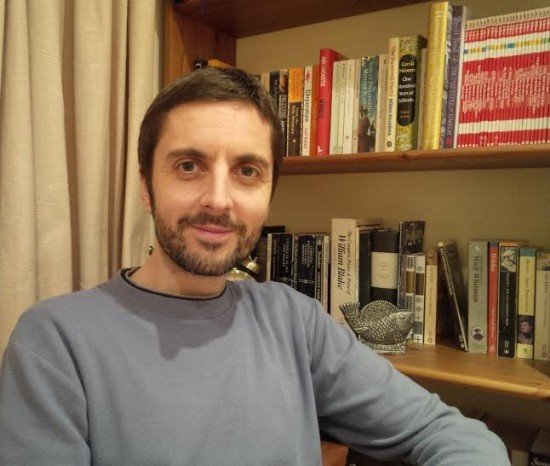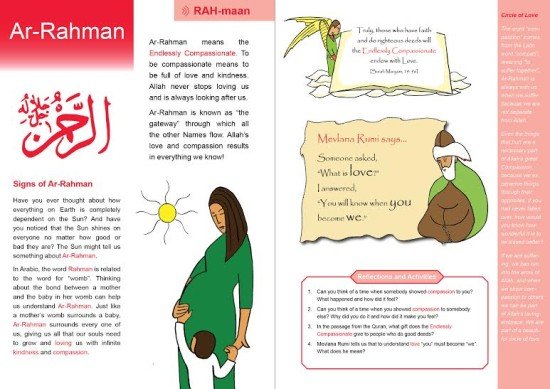[Interview] Daniel Dyer on his new project '99 Names of Allah' that aims to awaken children's innate empathy & creativity

 Passionate to share the love and wisdom that is at the heart of Islam and other spiritual traditions, Saimma and Daniel Dyer of Chickpea Press are working hard on a new book.‘The 99 Names of Allah’ creatively introduces younger readers to names that describe God, complemented with sacred traditions, activities, and reflections.I ask Daniel Dyer, the illustrator behind this colourful guide about what makes this book unique, how they have explored Islamic spirituality, and how we can help bring this book to life.
Passionate to share the love and wisdom that is at the heart of Islam and other spiritual traditions, Saimma and Daniel Dyer of Chickpea Press are working hard on a new book.‘The 99 Names of Allah’ creatively introduces younger readers to names that describe God, complemented with sacred traditions, activities, and reflections.I ask Daniel Dyer, the illustrator behind this colourful guide about what makes this book unique, how they have explored Islamic spirituality, and how we can help bring this book to life.
What inspired this book?
The beauty and power of the Names drew me. Something also told me that children need to explore them – not just adults. It began as a simple poem to orientate children to the Names, and then evolved into something much broader and, insha'Allah (God willing), much deeper.
What is unique about 'The 99 Names of Allah' book?
I don’t know of any children’s book in English that explores the 99 Names of Allah in way that I would wish for my children. For me, an exploration of the Names needs to be centred on the heart, on awakening children’s innate empathy, creativity and insight. It needs to help children to understand Allah’s attributes and to appreciate the places where these attributes are best reflected: in themselves and the natural world.As well as helping to foster a spiritual and ecological awareness, it needs to help them appreciate the diversity of modern societies. It should help them identify with all humanity, not just Muslims, and perhaps help them to appreciate that there is more than one path to God. It also needs to be imaginative, colourful and richly illustrated in order to really engage.
What do you hope to achieve from this book?
With this book, and all our future books, we aim to help young readers develop a relationship with the Divine; promote a spiritual, creative and heart-based approach to education; foster a sense of unity and interdependence between people of different faiths and cultures; cultivate an awareness of the equality of women and men; and encourage reverence and respect for the natural world.
"The book makes use of wisdom from other faiths and Muslims themselves are given the opportunity to deepen their appreciation of other religions."
Will the book appeal to people of all ages and faiths?
We hope so, inshallah. Writing the book is certainly an education for me, and if other adults can benefit from it as they share it with their children or students that would a great blessing. The book makes use of wisdom from other faiths, so people of all faiths may find their own faith used to complement the understanding of some Islamic concept, and Muslims themselves are given the opportunity to deepen their appreciation of other religions.
What ideas and techniques have you used in this book to explore Islamic spirituality?
We use a phonetic guide to help readers pronounce each Name, and, after a brief introduction to the essential meaning, a section suggests where readers might see signs of the Name in the outer world and within themselves. We also draw quotations directly from the Quran, great Prophets such as Muhammad, Jesus and Moses; and great personalities.Our aim is to give women as strong a representation as possible and to promote an appreciation of other faiths whilst celebrating Islam.The book is primarily aimed at 10-14 year olds, but it has been designed so that younger children can benefit from it too, especially if reading with a parent or teacher.
What research did you undertake, and how did you come up with the ideas, such as the reflection and activities sections?
We want to encourage creativity and the asking of questions. We believe that children have an innate knowledge within themselves and that the best way to learn is to be creative.Rather than merely spoon-feeding them information or a list of does and don’ts, the reflections and activities section aims to help children intuit knowledge and moral values for themselves. We want them to gain an experience of their own inner life and the workings of their hearts. For instance, when learning about Ar-Rahman, it is more important to us that children actually build compassion for others, rather than just being able to say what compassion is. In terms of research, the Quran, hadith and classical Sufi literature are significant sources. However, the contribution of contemporary Sufism is also significant, particularly the work of Mevlevi teachers Kabir and Camille Helminski. Another great source of inspiration and the best book for adults specifically on the 99 Names that I am aware of is The Physicians of the Heart.Our research also extends outside Islam into the other faiths. For instance, as The Physicians of the Heart points out, the Buddhist concept of karma can really help us understand the Name Al-Muntaqim (often translated, perhaps rather unsatisfactorily, as the Avenger).
In terms of research, the Quran, hadith and classical Sufi literature are significant sources. However, the contribution of contemporary Sufism is also significant, particularly the work of Mevlevi teachers Kabir and Camille Helminski. Another great source of inspiration and the best book for adults specifically on the 99 Names that I am aware of is The Physicians of the Heart.Our research also extends outside Islam into the other faiths. For instance, as The Physicians of the Heart points out, the Buddhist concept of karma can really help us understand the Name Al-Muntaqim (often translated, perhaps rather unsatisfactorily, as the Avenger).
We live in an age of new technology and digital media. Will this book help people connect with their spiritual side?
We hope, inshallah, to eventually create both an ebook and a digital app of The 99 Names of Allah. I think new technology can play a positive or negative role in terms of fostering spirituality – it depends on the content and how it is used.There is a proliferation of inane and destructive content out there, so we need to make sure more spiritual content is made available. However, to an extent, we also need to gently encourage children drag themselves away from their screens, to wake them up to the beauty of the natural world around them, and to the quiet grandeur of the world within their hearts.
Have you been inspired by any of your favorite authors and illustrators?
Outside Islamic literature, I particularly love nineteenth-century American literature: writers such as Emerson, Melville, Whitman and Dickinson – writers who really understood that Spirit underpins everything . As for children’s literature, I especially love Roald Dahl (and Quentin Blake’s illustrations), Dr Seuss and AA Milne – my father does a great Winnie the Pooh voice!
"A spiritual path can take many forms, but if it is genuine it will make you and your voice more authentic and your creativity will blossom."
What is your best piece of advice to aspiring authors and writers?
Find a spiritual path and persevere with it. A spiritual path can take many forms, but if it is genuine it will make you and your voice more authentic and your creativity will blossom.
How can our readers support your project?
By pre-ordering a copy (or copies) of the book or by simply donating on our crowdfunding page: http://igg.me/at/99NamesofAllahWe need to hit £30,000 by 22 March and would really appreciate your support!
What are your thoughts on Sufi Comics?
It’s a great project and your books are such a blessing. They present the essential Islam of the great Sufis in an accessible and imaginative way. Such great artwork and the stories draw on the very best our faith has to offer. We have gifted your books to many friends! We are so pleased to have a connection with the Vakil brothers and wish them continued success!
Support this project and help bring this colorful guide to life here.
Stay updated with Chickpea Press on Facebook.
Follow Chickpea Press on Twitter.
Sign up to our Newsletter and get the first three chapters of Sufi Comics: Rumi Free Read our previous interviews with creative artists here

